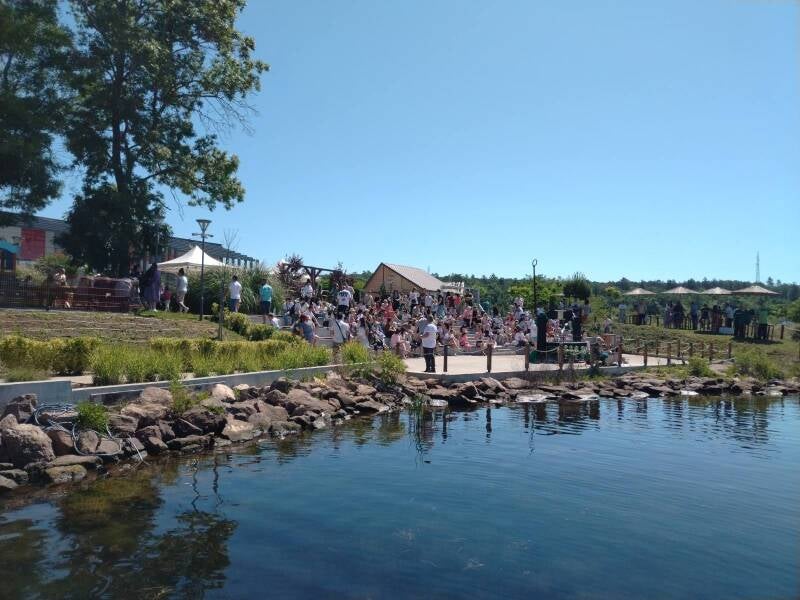
Chengene Skele, From Fishing Village to Tourist Attraction
Chengene Skele, a small fishing village 15 km south of Burgas in Bulgaria, has preserved its fishing traditions to this day. The village, originally considered an illegal settlement when residents were forced to move there in the 1970s due to the expansion of the Port of Burgas, has now developed into a popular tourist destination with a unique history and charm.

History of Chengene Skele
Chengene Skele is the only authentic fishing village on the Bulgarian Black Sea coast, with origins dating back to 1784. The village has retained its unique spirit and character, and the fishing tradition is still alive here. In the 1970s, residents were forced to move to Chengene Skele when the Port of Burgas was expanded, and the village was long considered an illegal settlement with uncertain status. However, today the Burgas municipality has invested in developing and promoting Chengene Skele's unique identity, transforming the village into a year-round destination for tourists. Much of the small-scale fishing in the region is concentrated in Chengene Skele, and the local fishing community has established productive relationships with local authorities to preserve and develop the village's tangible and intangible cultural heritage related to fishing crafts.
Fishing Traditions and Crafts
In Chengene Skele, visitors can experience and learn about traditional fishing practices and crafts. In the exhibition houses "Tayfa," "Buruntiya," and "Evksinski pont," one can embark on a journey through the history of the Black Sea, the fishermen's customs, and the everyday life of the sea wolves. This is the only place where one can see net knitting, rope entanglement, and sea knots, try traditional food, and hear stories about the fishermen's beliefs and legends. Visitors can also sample specialties based on old recipes and refreshing drinks in the small restaurant and coffee club that are part of the complex.
Cultural and Tourist Activities
Chengene Skele offers a wide range of cultural and tourist activities. Visitors can explore the multifunctional building and amphitheater, suitable for all types of indoor and outdoor events. The small beach next to the complex is perfect for relaxation, while the nearby dock offers opportunities for sea adventures by boat and enjoying the most beautiful sunsets in Burgas Bay. The Burgas municipality has also invested in the production and delivery of a tourist ship with a capacity of up to 100 passengers, enabling flexible tourist services that combine visits of varying duration and scope to places showcasing the region's cultural heritage. Additionally, regular training sessions, exhibitions, plenaries, and festivals are organized to develop the maritime culture among the population.
Local Legends and Myths
Chengene Skele has a rich folklore and many local legends and myths related to the sea and fishing. The fishermen in the village have passed down stories for generations about mermaids, water nymphs, and other mythological creatures said to inhabit the Black Sea. According to a local legend, one can sometimes hear the mermaids' alluring song echoing over the water at dusk.Another popular legend involves a powerful sea god who controls the weather and determines fishing luck. Fishermen used to offer part of their catch to the sea god to appease him and ensure a good harvest from the sea. These old traditions and stories are still alive today and are an important part of Chengene Skele's cultural heritage, attracting curious visitors.

Culinary Culture and Traditional Dishes
In Chengene Skele, visitors can experience the local culinary culture and taste traditional Bulgarian dishes focusing on fresh fish and seafood from the Black Sea. The village is known for its fish restaurants serving classic dishes such as baked carp, mussels in white wine, grilled squid, and the famous fish soup "ribena chorba" made with various types of fish, vegetables, and spices. Other local specialties include "tsatsa" (dried and salted fish), "katak" (fish roe), and "mussels saganaki" (mussels in tomato sauce and feta cheese). The food is prepared according to old recipes passed down through generations and enjoyed with local wine and "rakia," a strong fruit brandy. Experiencing Chengene Skele's culinary culture is a must for food lovers and provides a unique insight into the village's history and traditions
Craftsmanship in Boat Building
In Chengene Skele, traditional craftsmanship in boat building has been preserved. Skilled boat builders still use old techniques and natural materials like wood to construct sturdy fishing boats adapted to the conditions of the Black Sea. Visitors can see the boat builders at work and learn about the different steps in the process, from selecting suitable wood to shaping the hull and assembling the details. Each boat is a unique craft that requires great skill and patience to complete. The finished boats are used by local fishermen and are an important part of the village's cultural heritage and identity. Experiencing the craftsmanship in boat building provides insight into Chengene Skele's proud traditions and lifestyle close to the sea.
Fishermen's Life and Work
The life and work of fishermen in Chengene Skele are characterized by a close connection to the sea and long-standing traditions. The fishermen still use small-scale, selective fishing methods such as rod fishing, nets, and traps to catch species like mackerel, sardines, anchovies, and mussels. Fishing often takes place early in the morning or late in the evening when the fishermen set out in their traditionally built wooden boats.The fishermen have extensive knowledge of the Black Sea's ecosystem, weather, and seasonal variations, which they use to locate fish schools. They work hard but also enjoy the camaraderie out at sea and the freedom the profession provides. The catch is sold fresh at local markets or delivered to the village's restaurants.Fishing families have often worked together for generations, and the knowledge is passed down from father to son. Women also play an important role by preparing food, repairing nets, and selling fish. Despite challenges from large-scale fishing and pollution, fishing in Chengene Skele remains a viable industry and a central part of the village's identity.







Add comment
Comments